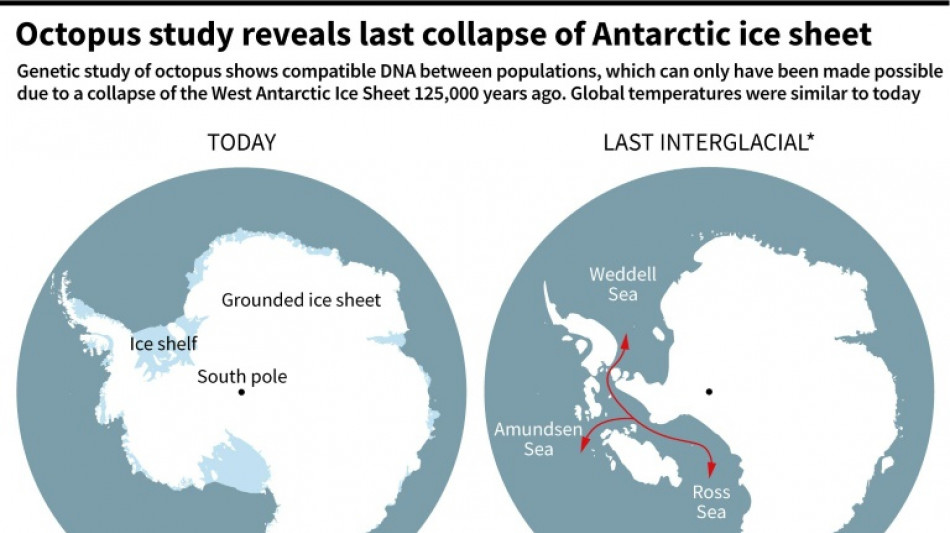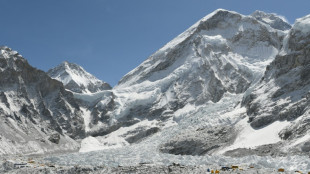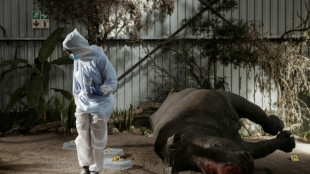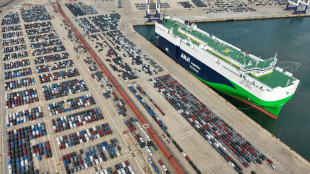
-
 Francis, a pope for the internet age
Francis, a pope for the internet age
-
Iraq's top Shiite cleric says Pope Francis sought peace

-
 Mourners flock to world's churches to grieve Pope Francis
Mourners flock to world's churches to grieve Pope Francis
-
Trump says Pope Francis 'loved the world'

-
 Sri Lanka recalls Pope Francis' compassion on Easter bombing anniversary
Sri Lanka recalls Pope Francis' compassion on Easter bombing anniversary
-
Pope Francis inspired IOC president Bach to create refugee team

-
 Alexander-Arnold will be remembered for 'good things' at Liverpool: Van Dijk
Alexander-Arnold will be remembered for 'good things' at Liverpool: Van Dijk
-
US VP Vance meets Indian PM Modi for tough talks on trade

-
 Pentagon chief dismisses reports he shared military info with wife
Pentagon chief dismisses reports he shared military info with wife
-
15 potential successors to Pope Francis

-
 The papabili - 15 potential successors to Pope Francis
The papabili - 15 potential successors to Pope Francis
-
Zhao sets up all-China clash after beating 2024 world snooker finalist Jones

-
 Ostapenko stuns Sabalenka to win Stuttgart title
Ostapenko stuns Sabalenka to win Stuttgart title
-
Argentina mourns loss of papal son

-
 African leaders praise Pope Francis's 'legacy of compassion'
African leaders praise Pope Francis's 'legacy of compassion'
-
Mehidy's five wickets help Bangladesh fight back in first Zimbabwe Test

-
 'The voice of god': Filipinos wrestle with death of Pope Francis
'The voice of god': Filipinos wrestle with death of Pope Francis
-
Prayers, disbelief in East Timor after Pope Francis death

-
 Real Madrid hold minute's silence as La Liga mourns Pope Francis
Real Madrid hold minute's silence as La Liga mourns Pope Francis
-
World leaders pay tribute to Pope Francis, dead at 88

-
 World leaders react to the death of Pope Francis
World leaders react to the death of Pope Francis
-
Zimbabwe lead first Test despite Bangladesh spinner Mehidy's five wickets

-
 Vatican postpones sainthood for 'God's influencer' after pope's death
Vatican postpones sainthood for 'God's influencer' after pope's death
-
Pope's death prompts CONI to call for sporting postponements, minute's silence

-
 Stunned and sad, faithful gather at St Peter's to remember Francis
Stunned and sad, faithful gather at St Peter's to remember Francis
-
Asian scam centre crime gangs expanding worldwide: UN

-
 Davos meet founder Klaus Schwab steps down from WEF board
Davos meet founder Klaus Schwab steps down from WEF board
-
Himalayan snow at 23-year low, threatening 2 billion people: report

-
 The beautiful game: Pope Francis's passion for football
The beautiful game: Pope Francis's passion for football
-
Clerical sex abuse: Pope Francis's thorniest challenge

-
 Pope Francis's delicate ties with politics in Argentina
Pope Francis's delicate ties with politics in Argentina
-
Russia resumes attacks on Ukraine after Easter truce

-
 Pope Francis has died aged 88
Pope Francis has died aged 88
-
Gaza civil defence describes medic killings as 'summary executions'

-
 Francis: radical leader who broke the papal mould
Francis: radical leader who broke the papal mould
-
Oscar stars, Max keeps mum, Sainz alive - Saudi GP talking points

-
 Iyer, Kishan win back India contracts as Pant's deal upgraded
Iyer, Kishan win back India contracts as Pant's deal upgraded
-
Vance lands in India for tough talks on trade

-
 Inside South Africa's wildlife CSI school helping to catch poachers
Inside South Africa's wildlife CSI school helping to catch poachers
-
Nigerian Afrobeat legend Femi Kuti takes a look inward

-
 Kim Kardashian: From sex tape to Oval Office via TV and Instagram
Kim Kardashian: From sex tape to Oval Office via TV and Instagram
-
Vance in India for tough talks on trade

-
 Thunder crush Grizzlies as Celtics, Cavs and Warriors win
Thunder crush Grizzlies as Celtics, Cavs and Warriors win
-
Vance heads to India for tough talks on trade

-
 China slams 'appeasement' of US as nations rush to secure trade deals
China slams 'appeasement' of US as nations rush to secure trade deals
-
'Grandpa robbers' go on trial for Kardashian heist in Paris

-
 Swede Lindblad gets first win in just third LPGA start
Swede Lindblad gets first win in just third LPGA start
-
Gold hits record, dollar drops as tariff fears dampen sentiment

-
 As Dalai Lama approaches 90, Tibetans weigh future
As Dalai Lama approaches 90, Tibetans weigh future
-
US defense chief shared sensitive information in second Signal chat: US media


Antarctic octopus DNA reveals ice sheet collapse closer than thought
Scientists investigating how Antarctica's ice sheets retreated in the deep past have turned to an innovative approach: studying the genes of octopuses that live in its chilly waters.
A new analysis published Thursday in Science finds that geographically-isolated populations of the eight-limbed sea creatures mated freely around 125,000 years ago, signaling an ice-free corridor during a period when global temperatures were similar to today.
The findings suggest the West Antarctic Ice Sheet (WAIS) is closer to collapse than previously thought, threatening 3.3-5 meters of long term sea level rise if the world is unable to hold human-caused warming to the 1.5 degrees Celsius target of the Paris Agreement, said the authors.
Lead author Sally Lau of James Cook University in Australia told AFP that as an evolutionary biologist focused on marine invertebrates, "I understand and then apply DNA and biology as a proxy of changes to Antarctica in the past."
Turquet's octopus made an ideal candidate for studying WAIS, she said, because the species is found all around the continent and fundamental information about it has already been answered by science, such as its 12-year-lifespan, and the fact it emerged some four million years ago.
About half-a-foot (15 centimeters) long excluding the arms and weighing around 1.3 pounds (600 grams), they lay relatively few, but large eggs on the bottom of the seafloor. This means parents must put significant effort into ensuring their offspring hatch -- a lifestyle that prevents them traveling too far away.
They are also limited by circular sea currents, or gyres, in some of their modern habitats.
- 'Tipping point close' -
By sequencing the DNA across genomes of 96 samples that were generally collected inadvertently as fishing bycatch and then left in museum storage over the course of 33 years, Lau and colleagues found evidence of trans-West Antarctic seaways that once connected the Weddell, Amundsen and Ross seas.
The history of genetic mixing indicated WAIS collapsed at two separate points -- first in the mid-Pliocene, 3-3.5 million years ago, which scientists were already confident about, and the last time in a period called the Last Interglacial, a warm spell from 129,000 to 116,000 years ago.
"This was the last time the planet was around 1.5 degrees warmer than pre-industrial levels," said Lau. Human activity, primarily burning fossil fuels, has so far raised global temperatures by 1.2C compared to the late 1700s.
There were a handful of studies prior to the new Science paper that also suggested WAIS collapsed some time in the past, but they were far from conclusive because of the comparatively lower resolution genetic and geological data.
"This study provides empirical evidence indicating that the WAIS collapsed when the global mean temperature was similar to that of today, suggesting that the tipping point of future WAIS collapse is close," the authors wrote.
Sea level rise of 3.3 meters would drastically alter the world map as we know it, submerging low-lying coastal areas everywhere.
Writing in an accompanying commentary piece, Andrea Dutton of the University of Wisconsin-Madison and Robert DeConto of the University of Massachusetts, Amherst described the new research as "pioneering," adding it posed intriguing questions about whether ancient history will be repeated.
They flagged however that several key questions remained unanswered -- such as whether the past ice sheet collapse was caused by rising temperatures alone, or whether other variables like changing ocean currents and complex interactions between ice and solid Earth were also at play.
It's also not clear whether the sea level rise would be drawn out over millennia or occur in more rapid jumps.
But uncertainties such as these can't be an excuse for inaction against climate change "and this latest piece of evidence from octopus DNA stacks one more card on an already unstable house of cards," they wrote.
P.Vogel--VB




